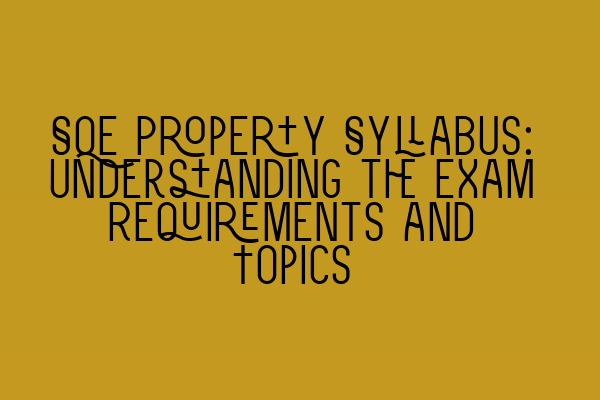SQE Property Syllabus: Understanding the Exam Requirements and Topics
Are you preparing for the SQE Property Law & Land Law exam and want to ensure that you have a thorough understanding of the exam requirements and topics? Look no further! In this comprehensive guide, we will break down the SQE Property syllabus, highlighting key areas of focus and providing essential information to help you excel in your exam.
1. Introduction to SQE Property Law & Land Law Exam
The SQE Property Law & Land Law exam is an important assessment for aspiring solicitors who wish to practice property law in the UK. This exam tests your knowledge and understanding of property law principles, concepts, and processes, as well as your ability to apply the law effectively to various scenarios.
By gaining a strong grasp of the exam requirements and topics, you can approach your preparation with confidence and optimize your chances of achieving a high score.
2. Exam Requirements
The SQE Property Law & Land Law exam consists of both multiple-choice questions and written tasks. The exam assesses your knowledge of the following key areas:
- Property Transaction Types and Processes
- Ownership and Tenure
- Co-ownership
- Leasehold and Freehold Estates
- Mortgages
- Restrictions on Land Use
- Landlord and Tenant Law
- Conveyancing and Land Registration
- Landlord and Tenant Disputes
- Easements
It is important to familiarize yourself with these areas and ensure that you have a solid understanding of the underlying principles and legal concepts.
3. Key Topics
Let’s delve deeper into some of the key topics covered in the SQE Property Law & Land Law exam:
3.1 Property Transaction Types and Processes
This topic covers the various types of property transactions, such as sales, leases, and mortgages, and the legal processes involved in these transactions. It includes the essential steps and documentation required for a property transaction to be legally valid.
To dive deeper into this topic, check out our article on Updates in UK Property Laws: Key Changes and Implications.
3.2 Ownership and Tenure
Ownership and tenure refer to the legal rights and interests individuals have in property. This topic explores the different types of ownership, such as fee simple absolute, life estates, and leasehold interests. It also delves into the concept of legal and equitable interests in property.
For a comprehensive guide on legal challenges in property transactions, including ownership and tenure issues, read our article on Legal challenges in property transactions: A comprehensive guide.
3.3 Leasehold and Freehold Estates
Leasehold and freehold estates refer to the different types of property ownership. This topic explores the rights and obligations of leasehold and freehold property owners, including the responsibilities of landlords and tenants, lease terms, and termination of leases.
If you want essential guidelines for tenants and landlords regarding lease laws in the UK, don’t miss our article on Navigating Lease Laws in the UK: Essential Guidelines for Tenants and Landlords.
3.4 Mortgages
Mortgages are a critical aspect of property law. This topic covers the legal framework surrounding mortgages, including the creation, registration, and enforcement of mortgages. It also explores mortgagee and mortgagor rights and remedies in case of default.
3.5 Landlord and Tenant Law
Landlord and tenant law focuses on the legal relationship between landlords and tenants, including rights, obligations, and disputes. It covers topics such as rent, repairs and maintenance, eviction, and tenant protection laws.
To avoid common pitfalls related to landlord and tenant law, read our article on Dominate Property Law Questions: Avoiding Common Pitfalls.
3.6 Conveyancing and Land Registration
Conveyancing and land registration involve the legal process of transferring property ownership from one individual or entity to another. This topic covers the essential steps and documentation involved in the conveyancing process, as well as the registration of land ownership.
3.7 Landlord and Tenant Disputes
Landlord and tenant disputes can arise from various issues, such as rent arrears, breaches of lease terms, or property maintenance disputes. This topic explores the legal principles and procedures for resolving these disputes, including alternative dispute resolution methods and court proceedings.
3.8 Easements
Easements refer to the rights one person has over another person’s property. This topic covers the creation, enforcement, and termination of easements, as well as the rights and obligations of easement holders and property owners.
4. Conclusion
Gaining a thorough understanding of the SQE Property syllabus is crucial to achieving success in the exam. By focusing on the key exam requirements and topics highlighted in this guide, you can confidently approach your exam preparation.
For further guidance on how to prepare for the SQE Property Law & Land Law exam and ace your revision, check out our article on Land Law Revision Tips: Ace Your Exam Preparation.
We wish you the best of luck in your exam preparation and future career in property law!
